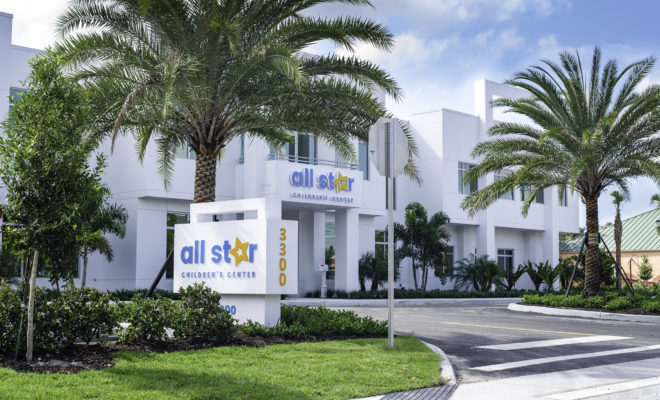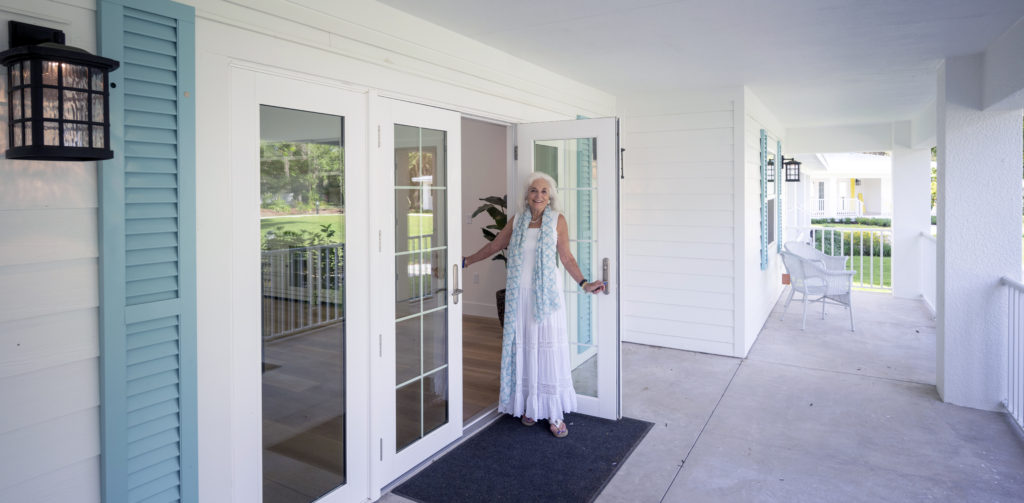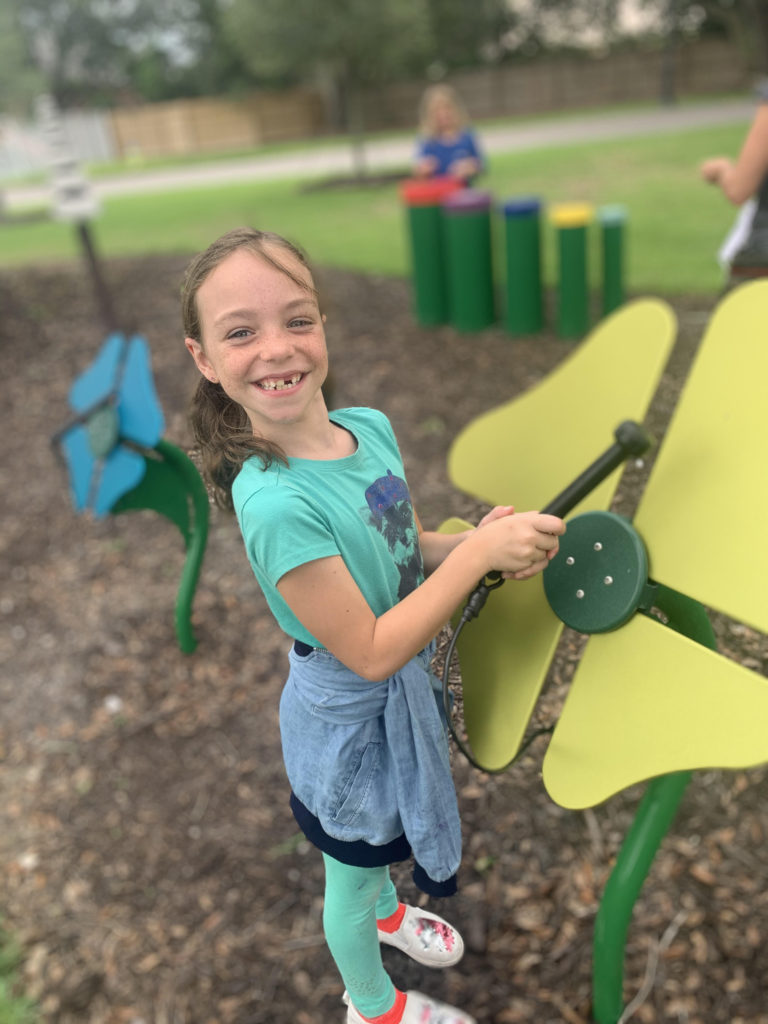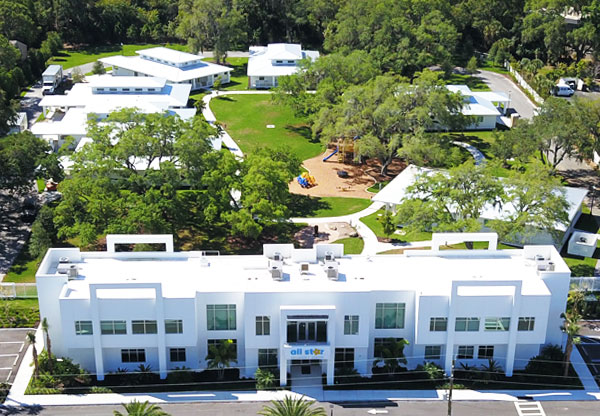
Feature
Transforming Foster Care: All Star Children’s Foundation
By William Bradford Nichols
April 2021
All Star Children’s Foundation and its members are on a mission to transform foster care in Florida—and maybe even across the country—from right here in Sarasota. The organization broke ground on a five-acre campus on 17th Street in November of 2017. That milestone was the fruit of over a decade’s worth of hard work. For ASCF’s founder, Graci McGillicuddy, the journey started back in 1986 when she read about a horrible case of child abuse.

McGillicuddy had already raised two children of her own and until she’d read the article, didn’t even know that child abuse existed. She recalls her own childhood as idyllic. Her parents, she said, were extremely loving and wonderfully protective. “When I read it, I couldn’t stop crying,” she said.
McGillicuddy turned to her husband and, remembering that it was almost her birthday, said, “Dennis, I’ve got to find a place that helps kids like this. So instead of buying me a piece of jewelry this year, please give me money and I’ll find a place to give where they help these kids.” That is how she first came to work with the Child Protection Center, or CPC, which also operates here in Sarasota. From that moment on, she had found her calling. McGillicuddy became a member of the CPC’s Board of Directors and remains one to this day.
ASCF was originally founded as a fundraising group, back in 2005, with the goal of giving grants to organizations working to treat and prevent child abuse. The group was forced to shut down for a short time in 2008 following the financial crisis, but when they restarted, McGillicuddy wanted to do more than just raise funds. She wanted to change the foster care system as a whole, starting with individual children. “We have 1,500 children in foster care in this beautiful community of Sarasota, Manatee, and DeSoto counties,” she says. “and that’s just the tip of the iceberg.”
ASCF’s campus has a pediatric mental health treatment and research facility as well as six independently licensed foster homes. The campus also includes a clubhouse and a playground. ASFC helps children between the ages of 0-18 and their biological families. The goal is reunification with the parents when possible and permanent placement with a loving relative or a loving family for adoption when reunification is not possible.
Foster parents are housed within the six large homes on the campus and those houses become the foster families’ homes. This is one of things that sets ASFC apart from normal residential facilities. There are no shift workers in these homes. Rather, the foster families rent the houses from the foundation and in return, receive evidence-based and trauma-informed services and support.

Dr. Kristin Hoffman, ASCF’s Chief Program Officer, explains that resident families are expected to house up to five foster children at time. A key benefit of this setup is that they can take whole sibling groups and keep families together. Each foster family agrees to stay in the home for two years, so they can offer stability to the children who live there for an extended time.
ASCF focuses on helping children who are entering the foster care system for the first time. Once in the home, children receive “trauma-informed care.” This care centers on understanding the history and specific needs of each individual child to drive intervention. Research focuses on how to best implement proven treatment and counseling for each child. Hoffman said, “We are not creating brand new treatments for trauma. Instead, we’re trying to figure out how to package and deliver existing best practices in unique and innovative ways.”
Foster parents are part of this as well. Every resident foster family agrees to be a part of the research and to the mission of ASCF, which is “to build brighter futures for children in foster care through innovation, science, and compassion.” Moreover, All Star clinicians help educate foster parents in the community using existing research and evidence-based curriculum as well.
All Star offers a 16-hour group Resource Parenting Curriculum that is taught over eight weeks. The foster parents learn that what worked with children they may have raised in the past is not necessarily going to work with kids in foster care who may have experienced complex trauma. The foster parents are educated in trauma-informed parenting and given the help and support they need to apply it in their home.
ASCF has felt the effects of the pandemic this year. Foster care trainings had to be curtailed, and the organization still needs to recruit two new foster families for their program. They have recruited four of the six families needed to fill the homes. McGillicuddy says that one unanticipated effect of COVID is that they have been able to get greater participation from caregivers in children’s therapeutic services than usual. During normal times they might have had “no shows” in a given week, but by offering remote options for sessions they have noticed a rise in participation.
McGillicuddy believes that it is tremendously important to engage the biological parents in their children’s services and supports. “Chances are that they’re only doing to their children what was done to them,” she said. “And the only way we’re going to break the cycle is to treat all of the children that have been abused.” Now that they have found that they can do these counselings, therapies, and treatments remotely with greater success, they can continue to offer them remotely even after COVID is long gone.

Since ASCF is an organization dedicated to changing the outcomes for children and families in the child welfare system and to helping the community understand some of the challenges these families face, they are open to collaboration with local communities.
“All I wanted to do was to keep children safe and make them feel nurtured and loved,” says McGillicuddy. For her, the building of ASCF’s campus was the fruition of that dream. When they broke ground on their facility, it was November 15, her birthday—almost 35 years to the day since she read that life-altering article. The child’s story that changed this woman’s life is now changing the lives of others. McGillicuddy is adamant that anyone can make a difference in the life of a child. She stands as a shining example of that truth.
For more information on the All Star Children’s Foundation, call 941.217.6503 or visit allstarchildrensfoundation.org.



You must be logged in to post a comment Login